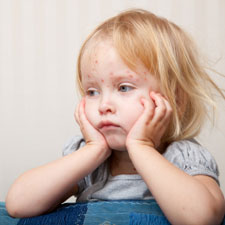Chickenpox Parties?
My sister is taking her young daughter to what she called a "chickenpox party." The idea is to expose her daughter to the chickenpox virus instead of having her vaccinated against it. Is this safe or are there other options?
Andrew Weil, M.D. | October 31, 2013

Chickenpox is a highly contagious disease common in early childhood. It is seen most often in children younger than 10 years. Chickenpox isn’t usually serious in healthy kids, but it can cause real problems for pregnant women, newborns, older individuals who haven’t yet had the disease, and those who are immune-compromised. Most people who get chickenpox will not get it again, but once infected, the body harbors the dormant virus, which can reactivate later in life to cause the disease known as shingles.
Chickenpox parties are meant to intentionally expose healthy kids to those infected with chickenpox. Essentially these parties are "play dates" sometimes facilitated by Facebook and other social media sites so that kids can be exposed to the virus, be infected and thus "naturally" obtain immunity.
Is it a good idea? I discussed your question with Sandy Newmark, M.D. a pediatrician at the Osher Center for Integrative Medicine in San Francisco. Dr. Newmark tells me that chickenpox parties were very common in the days before the varicella vaccine that protects against the disease became available. "The idea was to get your child exposed to chicken pox when he or she was young, and to have all of the children in the family exposed at once so that it didn’t take many weeks for the virus to pass through everyone in the household. Because chickenpox is so contagious, this is an effective way to increase exposure," Dr. Newmark explains. He adds, however, that the question of safety "is a little more complicated. Overall, chickenpox in children is a mild and benign disease. However, there is a small rate of serious complications, and each year a few children actually die of (them)." So, the practice of exposing kids to infected children "is relatively, but not completely, safe," Dr. Newmark says. "The only other alternatives are the vaccine or waiting to see if your child gets chickenpox naturally. Because the disease is more serious in teenagers and adults…I would definitely recommend vaccinating children who have not gotten it by age 10 or so," he adds.
As an alternative to chickenpox parties, some parents have mail-ordered lollipops allegedly sucked by infected children, as well as saliva, towels, clothes, and rags used by kids who have chickenpox. The idea was to infect kids by having them touch the contaminated items or suck on the chickenpox pops. There are strong arguments against this practice. Would you let your child take candy from a stranger on the street? If not, why is it acceptable to buy purportedly contaminated lollipops, clothes, towels and rags from strangers you meet online? Incidentally, the practice of contaminating the lollipops, selling them and sending them through the mail is illegal. What’s more, the chickenpox virus usually has to be inhaled to infect another person, so it is unlikely that this sort of thing will work.
Contracting the disease naturally will usually protect against reinfection for life, but opens the door for shingles. While getting the vaccine should prevent against ever contracting the disease, it is unknown yet if it confers lifelong immunity. The latest study on the effectiveness of the varicella vaccine to protect against chickenpox showed an effectiveness rate of 90 percent over the 14-year duration of the study, which followed 7,585 youngsters for 14 years. The study was published in the May 2013 issue of Pediatrics.
Andrew Weil, M.D.










